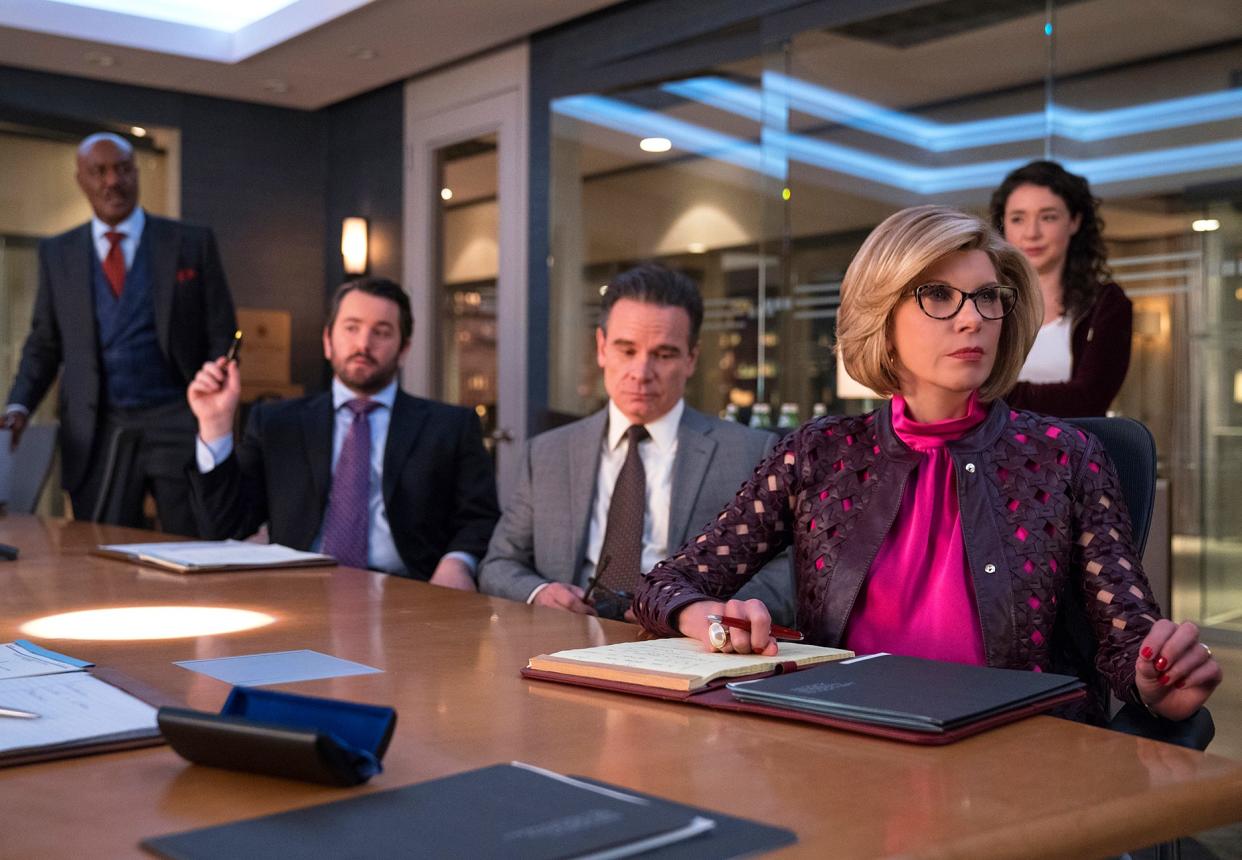The Good Fight Is One of the Best Shows (Not) on Television

The first two episodes of CBS All Access's excellent third season of The Good Fight (which premieres today on the streaming service) each interrupt themselves with splashy, campy animated musical performances, one about NDAs, the other about the notorious Roy Cohn. Maybe that seems strangely out of place if you're approaching the show expecting tightly wound legal drama (you'll get that), sharp performances by some of the finest actors around (that too), or a continuation of The Good Wife plot lines (sort of?). But where The Good Wife was consistently, perfunctorily good, The Good Fight upends all that in favor of balls-to-the-wall experimentation that often works and, even when it doesn't, provides ample enjoyment in the pursuit of something new. I like to lump The Good Fight together in my mind's pleasure center with my favorite thrill rides, the heart-stopping ones that actively induce the fight-or-flight "I just might die on this thing?" response I find myself craving so often, because both keep me gasping (often out loud, to the chagrin of my much more even-keeled partner) and yearning for more.
The Good Fight, for the uninitiated, is a streaming spinoff of the legal and political Julianna Margulies hit The Good Wife, which ran for seven seasons on CBS, picking up Emmys and critical acclaim the whole way through.
I was loath to pick up The Good Fight, not because I thought it would trail its predecessor in quality, but because I worried the masterful universe-building its creators, Michelle and Robert King, had done would fall apart without Margulies at the core. But in her wake, the masterful Christine Baranski finds more room to play with her already perfectly realized Diane Lockhart, a lawyer at the top of her game who's literally just trying to get through one single goddamn day in Trump's America. On Wife, Diane often took (worthy) center stage, but hers is a much larger spotlight on Fight, one that elevates her from supporting to main and opens viewers up to her home life as an equal component to her work one.
At its core the show is procedural. There's usually a Case of the Week that the lawyers at the Chicago firm of Reddick, Boseman & Lockhart have to tackle. As with Law & Order, they're sometimes ripped from the headlines, or at the very least extremely inspired by the headlines. But unlike with typical procedurals, there's identical weight given to season-long stories, like the Madoff-inspired Ponzi scandal that rocked the show's first season, or the way Diane spent its second year grappling with a president in opposition to her every belief. They're hour-long episodes that build and build and build; they never leave you hanging. There is always payoff, and storylines almost always end in "holy shit, how did they stick that landing?" splendor. That's largely thanks to both the expertly woven narratives courtesy of the Kings' oversight and the show's jaw-droppingly good performances.
There's Baranski, taking giant hulking chomps out of the scenery, enjoying every second of dialogue she's given. It's the kind of comedic and dramatic performance her fans have come to expect, but it transcends those expectations tenfold. Cush Jumbo would probably be racking up Emmy nominations for her deeply layered fourth-year associate Lucca Quinn if the show aired on network television, which is more of an indictment of Emmy voters' reluctance to embrace non-Netflix streamers than anything else. Sarah Steele turns in the funniest, most nuanced work currently onscreen as Marissa Gold, Diane's assistant and an investigator at the firm, a merciful carryover from The Good Wife.
Honestly, there could be 99 paragraphs in a review dedicated to the show's brilliant bench—Delroy Lindo (quiet but occasionally explosive as Adrian Boseman); Broadway legend Audra McDonald (warm but ruthless as Liz Lawrence); fellow Broadway legend (sensing a theme?) Andrea Martin as Lucca's sort-of mother-in-law, Francesca; Margo Martindale as the crackling, no-nonsense DNC consultant Ruth Eastman.
But there are stumbles, a byproduct of running full speed without guard rails. This season introduces Michael Sheen as a wild lawyer named Roland Blum, who quickly entangles himself in the show's goings-on, but—and maybe this is just the actor's extremely leaden and head-scratching accent work, the sort of vocal delivery you'd expect of someone who'd heard of accents other than his own and thought he'd just try his hand at it—something about his brand of chaos knocks The Good Fight ever so slightly askew. But then the camera cuts to a scene with Baranski bemoaning her very conservative husband's hunting trip with Eric and Don Jr., or to a singalong-style animated musical number about the ironclad effectiveness of nondisclosure agreements throughout the legal industry, and suddenly the train is back on the tracks, chugging along, barreling down its own path, always arriving right on schedule no matter how close to derailing it might've seemed. It's a balancing act of the highest degree, and watching it's a thrill unlike any other out there.

